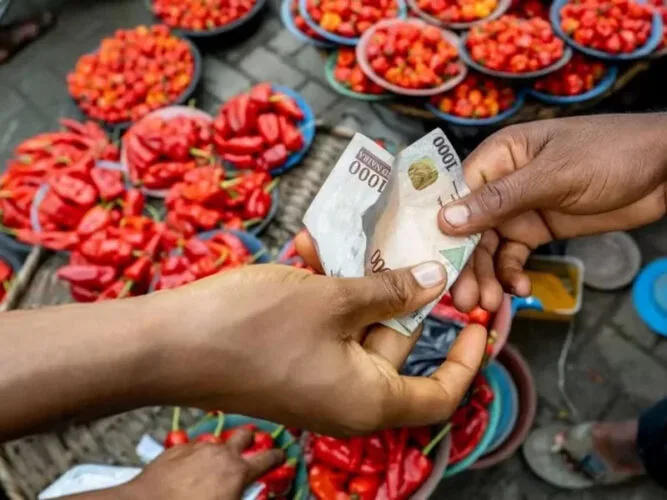Rising Costs, Diminishing Hope
Nigeria’s inflation crisis has entrenched itself in the daily lives of citizens, leaving households and businesses grappling with relentless economic pressure. With inflation climbing to 33.88 per cent in October 2024, many Nigerians feel the effects of a system stretched thin by governance lapses and unchecked market practices ahead of the festive periods.
The bustling markets of Lagos, often a reflection of the nation’s economic pulse, now tell tales of survival and despair. A year ago, a tuber of yam cost N2,800; today, it sells for N6,500. A 50kg bag of rice, a staple for many families, fluctuates between N96,000 and N105,000—prices that shift even within the same market. These figures are more than numbers; they represent the daily sacrifices made by millions of Nigerians.
Join our WhatsApp Channel“This inflation crisis is not just about numbers; it’s about lives disrupted,” says economist Dr. Bisi Ajayi. She points out that the ripple effects are hardest on the vulnerable, creating an economic and social imbalance that will take years to repair.
Everyday Nigerians Share Their Stories
In Oshodi Market, Mrs. Funmi Adewale, a mother of three, struggles to cope. “It’s not just inflation; it’s exploitation,” she says, clutching a smaller-than-usual basket of groceries. “Prices change daily. What I could afford last week is beyond my reach today.” Her frustration mirrors the sentiments of many Lagosians who feel abandoned by market systems and government policies.
In Yaba, Mr. Oladimeji Olanrewaju, a trader, paints a different picture. “We’re not hiking prices for fun,” he argues. “Transport costs are killing us, and suppliers charge more each time. What choice do we have?” His words highlight the complex interplay between logistics challenges and market dynamics that fuel the inflation crisis.
From Isolo, Mrs. Gloria Anya, a student, shares her perspective: “The prices of food stuffs are worrisome. As we approach december, prices of food stuffs are already showing signs of increase. A bag of rice is above N100,000, and others.” Her voice shakes as she describes skipping meals to stretch the family’s income.
Meanwhile, Mr. Adamu Bello, a taxi driver, also reveals how the crisis has changed his routine. “I used to fill my tank daily, but now I can only afford fuel every two days. Customers complain when we increase fares, but everything is expensive,” he laments.
READ ALSO: Inflation: CBN Raises Interest Rate To 27.5%
Experts Call for Action
Economists and policymakers agree that Nigeria’s inflation crisis demands immediate intervention. Dr. Ajayi emphasises, “What we see is not just inflation—it’s a failure of governance and oversight. Market regulation is non-existent, leaving citizens to fend for themselves.”
Mr. Gbenga Alawoye, another economist, suggests a pragmatic approach: “We need a market task force to monitor prices and enforce fair practices. It’s not enough to float policies that don’t touch ordinary lives.”
From the logistics sector, Engineer Kola Osho advocates targeted solutions: “Subsidising transport costs would ease the pressure on both traders and consumers. Without addressing the logistics bottleneck, the crisis will persist.”
Silent Tax on the Poor
Inflation is often described as a silent tax, and in Nigeria, this tax disproportionately burdens the poor. Rising transportation costs, opportunistic pricing, and inconsistent market regulations have deepened inequality. Dr. Ajayi explains, “The poor spend a higher percentage of their income on essentials. When prices rise, they are the first to suffer and the last to recover.”
This sentiment resonates with Mrs. Adewale. “I don’t know how to budget anymore,” she says. “Every week, it feels like I am losing a part of my livelihood. Is this what we deserve?”
Policy Gaps and Governance Failures
While structural reforms such as the removal of fuel subsidies and naira floating aim to stabilise the economy in the long term, their immediate impact has been harsh. Citizens like Ms. Anya find these policies detached from reality. “What’s the point of long-term reforms if people are starving now?” she asks.
Economist Alawoye highlights the need for balance. “Reforms should be paired with immediate relief measures,” he says. “Price monitoring, incentivising local production, and stabilising the naira are crucial steps, but they must go hand in hand with direct interventions for the people.”
Rebuilding Trust Through Transparency
One of the most damaging effects of the inflation crisis is the erosion of public trust. Erratic pricing and perceived government inaction fuel resentment among citizens. “The government must recognise that inflation is not just an economic issue but a social and political one,” says Dr. Ajayi.
For people like Mr. Bello, trust is already broken. “We’ve heard enough promises,” he says. “What we need is action—policies that make a real difference.”
The Path Forward
Addressing Nigeria’s inflation crisis requires a dual approach: long-term structural reforms and immediate interventions. Experts agree on actionable steps such as:
- Standardising market prices through a dedicated task force.
- Supporting local production to reduce reliance on imports.
- Subsidising logistics to ease transportation costs.
Dr. Ajayi sums up the stakes: “This crisis is a test of leadership. If addressed properly, it can pave the way for sustainable growth. If ignored, it will deepen poverty and unrest.”
A Call for Urgent Action
As the festive season approaches, the strain on households will only grow. Prices for basic goods are expected to rise further, placing additional burdens on already stretched incomes. The government must act now to ease the pressure and rebuild confidence.
“This isn’t just about food and money,” says Ms. Anya. “It’s about our future as Nigerians. We need solutions, not speeches.”
The inflation crisis has become a defining moment for Nigeria. How the government responds will shape the country’s economic and social landscape for years to come.
Emmanuel Ochayi is a journalist. He is a graduate of the University of Lagos, School of first choice and the nations pride. Emmanuel is keen on exploring writing angles in different areas, including Business, climate change, politics, Education, and others.


















Follow Us